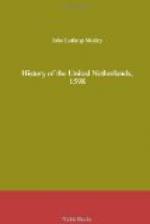Thus the causes of what is called the greatness of Spain are not far to seek. Spain was not a nation, but a temporary and factitious conjunction of several nations, which it was impossible to fuse into a permanent whole, but over whose united resources a single monarch for a time disposed. And the very concentration of these vast and unlimited, powers, fortuitous as it was, in this single hand, inspiring the individual, not unnaturally, with a consciousness of superhuman grandeur; impelled him to those frantic and puerile efforts to achieve the impossible which resulted, in the downfall of Spain. The man who inherited so much material greatness believed himself capable of destroying the invisible but omnipotent spirit of religious and political liberty in the Netherlands, of trampling out the national existence of France and of England, and of annexing those realms to his empire: It has been my task to relate, with much minuteness, how miserably his efforts failed.
But his resources were great. All Italy was in his hands, with the single exception of the Venetian republic; for the Grand Duke of Florence and the so-called republic of Genoa were little more than his vassals, the pope was generally his other self, and the Duke of Savoy was his son-in-law. Thus his armies, numbering usually a hundred thousand men, were supplied from the best possible sources. The Italians were esteemed the best soldiers for siege; assault, light skirmishing. The German heavy troopers and arquebuseers were the most effective for open field-work, and these were to be purchased at reasonable prices and to indefinite amount from any of the three or four hundred petty sovereigns to whom what was called Germany belonged. The Sicilian and Neapolitan pikemen, the Milanese light-horse, belonged exclusively to Philip, and were used, year after year, for more than a generation of mankind, to fight battles in which they had no more interest than had their follow-subjects in the Moluccas or in Mexico, but which constituted for them personally as lucrative a trade on the whole as was afforded them at that day by any branch of industry.
Silk, corn, wine, and oil were furnished in profusion from these favoured regions, not that the inhabitants might enjoy life, and, by accumulating wealth, increase the stock of human comforts and contribute to intellectual and scientific advancement, but in order that the proprietor of the soil might feed those eternal armies ever swarming from the south to scatter desolation over the plains of France, Burgundy, Flanders, and Holland, and to make the crown of Spain and the office of the Holy Inquisition supreme over the world. From Naples and Sicily were derived in great plenty the best materials and conveniences for ship-building and marine equipment. The galleys and the galley-slaves furnished by these subject realms formed the principal part of the royal navy. From distant regions, a commerce which in Philip’s days had become oceanic supplied the crown with as much revenue as could be expected in a period of gross ignorance as to the causes of the true grandeur and the true wealth of nations. Especially from the mines of Mexico came an annual average of ten or twelve millions of precious metals, of which the king took twenty-five per cent. for himself.




